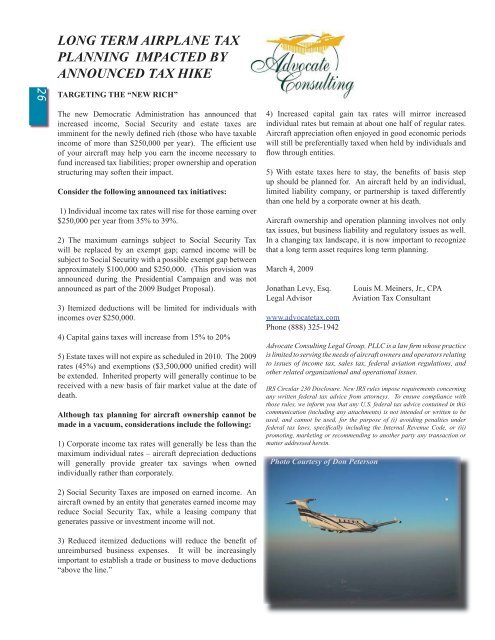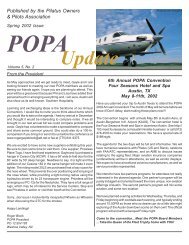Popa - Pilatus Owners and Pilots Association
Popa - Pilatus Owners and Pilots Association
Popa - Pilatus Owners and Pilots Association
Create successful ePaper yourself
Turn your PDF publications into a flip-book with our unique Google optimized e-Paper software.
26<br />
LONG TERM AIRPLANE TAX<br />
PLANNING IMPACTED BY<br />
ANNOUNCED TAX HIKE<br />
TARGETING THE “NEW RICH”<br />
The new Democratic Administration has announced that<br />
increased income, Social Security <strong>and</strong> estate taxes are<br />
imminent for the newly defi ned rich (those who have taxable<br />
income of more than $250,000 per year). The effi cient use<br />
of your aircraft may help you earn the income necessary to<br />
fund increased tax liabilities; proper ownership <strong>and</strong> operation<br />
structuring may soften their impact.<br />
Consider the following announced tax initiatives:<br />
1) Individual income tax rates will rise for those earning over<br />
$250,000 per year from 35% to 39%.<br />
2) The maximum earnings subject to Social Security Tax<br />
will be replaced by an exempt gap; earned income will be<br />
subject to Social Security with a possible exempt gap between<br />
approximately $100,000 <strong>and</strong> $250,000. (This provision was<br />
announced during the Presidential Campaign <strong>and</strong> was not<br />
announced as part of the 2009 Budget Proposal).<br />
3) Itemized deductions will be limited for individuals with<br />
incomes over $250,000.<br />
4) Capital gains taxes will increase from 15% to 20%<br />
5) Estate taxes will not expire as scheduled in 2010. The 2009<br />
rates (45%) <strong>and</strong> exemptions ($3,500,000 unifi ed credit) will<br />
be extended. Inherited property will generally continue to be<br />
received with a new basis of fair market value at the date of<br />
death.<br />
Although tax planning for aircraft ownership cannot be<br />
made in a vacuum, considerations include the following:<br />
1) Corporate income tax rates will generally be less than the<br />
maximum individual rates – aircraft depreciation deductions<br />
will generally provide greater tax savings when owned<br />
individually rather than corporately.<br />
2) Social Security Taxes are imposed on earned income. An<br />
aircraft owned by an entity that generates earned income may<br />
reduce Social Security Tax, while a leasing company that<br />
generates passive or investment income will not.<br />
3) Reduced itemized deductions will reduce the benefi t of<br />
unreimbursed business expenses. It will be increasingly<br />
important to establish a trade or business to move deductions<br />
“above the line.”<br />
4) Increased capital gain tax rates will mirror increased<br />
individual rates but remain at about one half of regular rates.<br />
Aircraft appreciation often enjoyed in good economic periods<br />
will still be preferentially taxed when held by individuals <strong>and</strong><br />
fl ow through entities.<br />
5) With estate taxes here to stay, the benefi ts of basis step<br />
up should be planned for. An aircraft held by an individual,<br />
limited liability company, or partnership is taxed differently<br />
than one held by a corporate owner at his death.<br />
Aircraft ownership <strong>and</strong> operation planning involves not only<br />
tax issues, but business liability <strong>and</strong> regulatory issues as well.<br />
In a changing tax l<strong>and</strong>scape, it is now important to recognize<br />
that a long term asset requires long term planning.<br />
March 4, 2009<br />
Jonathan Levy, Esq. Louis M. Meiners, Jr., CPA<br />
Legal Advisor Aviation Tax Consultant<br />
www.advocatetax.com<br />
Phone (888) 325-1942<br />
Advocate Consulting Legal Group, PLLC is a law fi rm whose practice<br />
is limited to serving the needs of aircraft owners <strong>and</strong> operators relating<br />
to issues of income tax, sales tax, federal aviation regulations, <strong>and</strong><br />
other related organizational <strong>and</strong> operational issues.<br />
IRS Circular 230 Disclosure. New IRS rules impose requirements concerning<br />
any written federal tax advice from attorneys. To ensure compliance with<br />
those rules, we inform you that any U.S. federal tax advice contained in this<br />
communication (including any attachments) is not intended or written to be<br />
used, <strong>and</strong> cannot be used, for the purpose of (i) avoiding penalties under<br />
federal tax laws, specifi cally including the Internal Revenue Code, or (ii)<br />
promoting, marketing or recommending to another party any transaction or<br />
matter addressed herein.<br />
Photo Courtesy of Don Peterson



